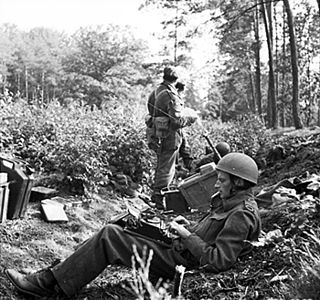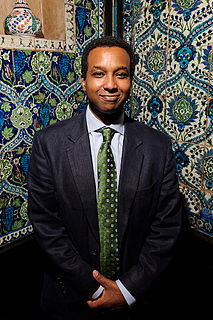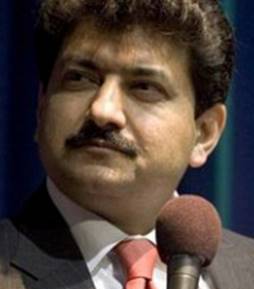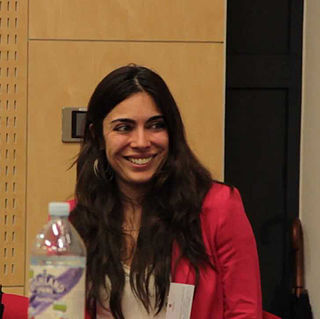Related Research Articles

Sayyid Ruhollah Musavi Khomeini, also known in the Western world as Ayatollah Khomeini, was an Iranian political and religious leader. He was the founder of the Islamic Republic of Iran and the leader of the 1979 Iranian Revolution, which saw the overthrow of the last Shah of Iran, Mohammad Reza Pahlavi, and the end of the 2,500-year-old Persian monarchy. Following the revolution, Khomeini became the country's Supreme Leader, a position created in the constitution of the Islamic Republic as the highest-ranking political and religious authority of the nation, which he held until his death. Most of his period in power was taken up by the Iran–Iraq War of 1980–1988. He was succeeded by Ali Khamenei on 4 June 1989.

Patrick Oliver Cockburn is a journalist who has been a Middle East correspondent for the Financial Times since 1979 and, from 1990, The Independent. He has also worked as a correspondent in Moscow and Washington and is a frequent contributor to the London Review of Books.

Andrew Paul Gilligan is a British policy adviser and journalist, currently transport adviser to the Prime Minister. Until July 2019, he was senior correspondent of The Sunday Times and had also served as head of the Capital City Foundation at Policy Exchange. Between 2013 and 2016 he also worked as cycling commissioner for London. He is best known for a 2003 report on BBC Radio 4's The Today Programme in which he described a British government briefing paper on Iraq and weapons of mass destruction as 'sexed up'.

Sayyid Jamāl al-Dīn al-Afghānī, also known as Sayyid Jamāl ad-Dīn Asadābādī and commonly known as Al-Afghani, was a political activist and Islamic ideologist who travelled throughout the Muslim world during the late 19th century. He is one of the founders of Islamic Modernism as well as an advocate of Pan-Islamic unity in Europe and Hindu–Muslim unity in India against the British, he has been described as being less interested in minor differences in Islamic jurisprudence than he was in organizing a united response to Western pressure. He is also known for his involvement with his follower Mirza Reza Kermani in the successful plot to assassinate Shah Naser-al-Din, whom Al-Afghani considered to be making too many concessions to foreign powers, especially the British Empire.

Farnaz Fassihi is an Iranian-American journalist. She writes about Iran for The New York Times. Previously she was a senior writer for The Wall Street Journal for 17 years and a conflict reporter based in the Middle East.

A war correspondent is a journalist who covers stories first-hand from a war zone.

Rageh Omaar is a Somali-born British journalist and writer. He was a BBC world affairs correspondent, where he made his name reporting from Iraq. In September 2006, he moved to a new post at Al Jazeera English, where he presented the nightly weekday documentary series Witness until January 2010. The Rageh Omaar Report, first aired February 2010, is a one-hour, monthly investigative documentary in which he reports on international current affairs stories. From January 2013, he became a special correspondent and presenter for ITV News, reporting on a broad range of news stories, as well as producing special in-depth reports from all around the UK and further afield. A year after his appointment, Omaar was promoted to International Affairs Editor for ITV News. Since October 2015, alongside his duties as International Affairs Editor, he has been a Deputy Newscaster of ITV News at Ten. Since September 2017 Omaar has occasionally presented the ITV Lunchtime News including the ITV News London Lunchtime Bulletin and the ITV Evening News.

Nikahang Kowsar, also known as Nik Kowsar is an Iranian-Canadian cartoonist, journalist, and blogger, currently living in Washington, D.C., US. Kowsar was also a reformist candidate for the second term of city council of Tehran in 2003, an election won by the conservative candidates of Abadgaran.

Akbar Ganji is an Iranian journalist, writer and a former member of Islamic Revolutionary Guard Corps. He has been described as "Iran's preeminent political dissident", and a "wildly popular pro-democracy journalist" who has crossed press censorship "red lines" regularly. A supporter of the Islamic revolution as a youth, he became disenchanted in the mid-1990s and served time in Tehran's Evin Prison from 2001 to 2006 after publishing a series of stories on the murder of dissident authors known as the Chain Murders of Iran. While in prison he issued a manifesto which established him as the first "prominent dissident, believing Muslim and former revolutionary" to call for a replacement of Iran's theocratic system with "a democracy".

Hamid Mir is a Pakistani journalist, columnist and an author. Born in Lahore to a journalistic family, Mir initially worked as a journalist with Pakistani newspapers. He has hosted the political talk show Capital Talk on Geo News. He writes columns for Urdu as well as English newspapers, both national and international. He is well-known for his stance against the dominance of the Establishment in Pakistan.

Vali Reza Nasr is an Iranian-American academic and author specializing in the Middle East and the Islamic world. He is Majid Khaddouri Professor of International Affairs and Middle East Studies at Johns Hopkins School of Advanced International Studies (SAIS) in Washington, D.C. He served as the eighth dean of the school from 2012 to 2019. Nasr is also a Non-Resident Fellow in South Asia at Atlantic Council and is described by The Economist as "a leading world authority on Shia Islam".

Press TV is an Iranian state-owned news and documentary network that broadcasts in the English and French languages owned by Islamic Republic of Iran Broadcasting (IRIB), the only organization legally able to transmit radio and TV broadcasts in Iran. The 24-hour channel, which has headquarters in Tehran, was launched on 2 July 2007 and was intended to compete with western English language services.

Ramita Navai is an Emmy and Robert F. Kennedy award-winning British-Iranian journalist, documentary producer and author. She has reported from over forty countries and has a reputation for investigations and work in hostile environments.

Salar Abdoh is an Iranian novelist and essayist. He is the author of the novels The Poet Game (2000), Opium (2004), Tehran At Twilight (2014), and the editor and translator of the anthology Tehran Noir (2014). He is also a director of the graduate program in Creative Writing at the City College of New York at the City University of New York.

Iran and Saudi Arabia have had no diplomatic relations following an attack on the Saudi embassy in Tehran in January 2016 after Saudi Arabia executed Sheikh Nimr al-Nimr, a Shia cleric. Bilateral relations between the countries have been strained over several geo-political issues such as the interpretations of Islam, aspirations for leadership of the Islamic world, oil export policy and relations with the United States and other Western countries.

BBC Persian Television is the BBC's Persian language news channel that was launched on 14 January 2009. The service is broadcast by satellite and is also available online. It is aimed at the 120 million Persian-speakers in Iran, Afghanistan, Tajikistan, and Uzbekistan.
Mustafa Hamid, also known as Abu Walid al-Masri and Hashim al-Makki, is a journalist who in the 1980s fought as an Islamic jihad volunteer during the Soviet–Afghan War. He is reported to have been an al-Qaeda advisor and taught at the Al Farouq training camp in the 1990s. He served as a bureau chief in Afghanistan for Al Jazeera from 1998–2001, before leaving for Iran.
Abu Mustafa al-Sheibani also known as Hamid Thajil Warij al-Attabi or Hamid al-Sheibani is an Iraqi Shi'a leader who commands his own insurgent group and smuggling network known as the Sheibani Network, which became one of the Iraqi Special Groups. An arrest warrant was issued for him by the Central Criminal Court of Iraq on 12 April 2005 with a reward of $200,000 for information leading to his capture. In 2006 he was added to the Iraqi Government's 41 Most-Wanted list. He holds both Iraqi and Iranian nationality because he lived in exile in Iran during Saddam Hussein's rule later returned there to live in Tehran after 2006. In September 2010, after Iraqi Prime Minister Nouri al-Maliki formed a coalition government with Shi'a rebel leader Muqtada al-Sadr, Sheibani was allowed to return to Iraq along with Abu Deraa.
Reuel Marc Gerecht is an American writer and political analyst focused on the Middle East. He is a senior fellow at the Foundation for Defense of Democracies, focusing primarily on the Middle East, Islamic militancy, counterterrorism, and intelligence. He is a former director of the Project for the New American Century's Middle East Initiative and a former resident fellow at the American Enterprise Institute. Earlier in his career Gerecht was a case officer at the CIA, primarily working on Middle Eastern targets.

Ruhollah Khomeini's life in exile was the period that Grand Ayatollah Ruhollah Khomeini spent from 1964 to 1979 in Turkey, Iraq and France, after Mohamed Reza Shah Pahlavi had arrested him twice for dissent from his “White Revolution” announced in 1963. Ayatollah Khomeini was invited back to Iran by the government, and returned to Tehran from exile on 1979.
References
- ↑ Geramifard, Mehdi. "Hamid Golpira" . Retrieved July 10, 2015.
- ↑ Golpira, Hamid. "Red Shia Crescent rising". Tehran Times Portal. Tehran Times. Retrieved July 10, 2015.
- ↑ Daily Motion. "NSA Spying". Daily Motion. Press TV. Retrieved July 10, 2015.